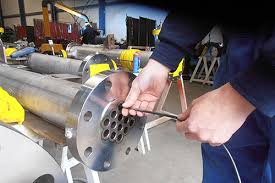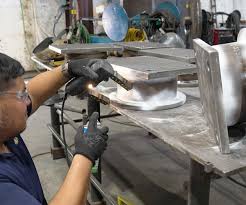Advantages of Magnetic Flux Leakage Inspection in Egypt
Magnetic flux leakage inspection in Egypt is a valuable non-destructive testing method for detecting defects in steel structures and pipelines. This technique offers numerous advantages for the inspection of infrastructure in Egypt, including its ability ultrasonic testing of welds to provide accurate and reliable results, its cost-effectiveness, and its ability to be used in various environmental conditions. In this article, we will explore the advantages of magnetic flux leakage inspection in Egypt and its impact on the maintenance and safety of critical infrastructure in the country.
Magnetic Flux Leakage (MFL) inspection has several advantages in Egypt. It is a non-intrusive and non-destructive testing method that can effectively detect corrosion, pitting, and wall thinning in various types of pipelines and storage tanks. The technique is particularly beneficial in Egypt due to the country's extensive network of oil non destructive testing ndt services and gas pipelines, which are susceptible to corrosion and deterioration. MFL inspection can help to identify areas of concern and prevent potential leaks or failures, ultimately contributing to the safety and integrity of Egypt's infrastructure. Additionally, the efficiency and accuracy of MFL inspection make it an ideal choice for the country's industrial and energy sectors, enabling timely maintenance and minimizing the risk of costly downtime. Overall, the adoption of MFL inspection in Egypt offers significant advantages in terms of asset reliability, operational continuity, and environmental protection.
Advantages of Magnetic Flux Leakage Inspection in Egypt

Magnetic flux leakage (MFL) inspection offers several advantages in Egypt, particularly in the oil and gas industry. This non-destructive testing method is known for its accuracy in detecting corrosion and other defects in pipelines and storage tanks. By using MFL inspection, companies in Egypt can effectively identify areas of concern and take necessary measures to address them, ultimately ensuring ndt testing services the integrity and safety of their infrastructures. Additionally, MFL inspection can be conducted quickly and remotely, reducing downtime and minimizing disruption to operations. With the country's substantial investment in its oil and gas infrastructure, the benefits of MFL inspection in Egypt are significant in terms of maintaining operational efficiency and safety standards.
The Growing Importance of Magnetic Flux Leakage Inspection in Egypt

Magnetic Flux Leakage (MFL) inspection has been increasingly recognized as a crucial non-destructive testing technique in Egypt. As the country's infrastructure continues to develop, the need for accurate and efficient inspection methods to maintain the integrity of critical assets such as pipelines, storage tanks, and pressure vessels has become imperative. MFL inspection offers high sensitivity to detect corrosion, cracks, and other defects in metallic structures, ensuring the safety and reliability of infrastructural elements. The growing importance of MFL inspection in Egypt is driven by the need to minimize the risk of structural failures and maintain compliance with safety regulations and standards. As a result, industries across Egypt are increasingly investing in MFL inspection technologies and expertise to safeguard their assets and operations.
How Magnetic Flux Leakage Inspection is Transforming Egypt's Industrial Sector

Magnetic Flux Leakage (MFL) inspection technology has been transforming Egypt's industrial sector by enabling non-destructive testing of pipelines and storage tanks. This advanced method uses magnetic fields to detect and characterize defects in metallic structures, allowing for early detection of corrosion and other types of damage. By implementing MFL inspection, industries in Egypt are able to proactively monitor the integrity of their infrastructure, reducing the risk of leaks, spills, and unplanned downtime. Additionally, MFL inspection helps to comply with regulatory standards and improve overall safety and reliability within the industrial sector. Overall, the adoption of MFL inspection technology is playing a crucial role in enhancing the efficiency and sustainability of Egypt's industrial operations.
Challenges and Opportunities for Magnetic Flux Leakage Inspection in Egypt
Challenges for MFL inspection in Egypt include the requirement for highly skilled technicians and engineers to operate the equipment, as well as the need for ongoing training and development to keep pace with technological advancements. Additionally, there may be limitations in access to certain areas for inspection due to safety concerns or restrictions. Opportunities for MFL inspection in Egypt include the growing demand for non-destructive testing in various industries such as oil and gas, petrochemical, and construction. There is also potential for collaboration with international companies and organizations to enhance expertise and technology in this field. The increasing focus on infrastructure development in Egypt presents opportunities for the use of MFL inspection in ensuring the integrity of pipelines, storage tanks, and other critical assets.
The Role of Magnetic Flux Leakage Inspection in Egypt's Infrastructure Development
Magnetic flux leakage (MFL) inspection plays a crucial role in Egypt's infrastructure development, particularly in the oil and gas industry. This non-destructive testing technique is widely used for the inspection of pipelines, storage tanks, and other critical infrastructure to detect and characterize corrosion and other defects. By implementing MFL inspection in its infrastructure development, Egypt can ensure the safety and integrity of its energy transportation and storage systems, ultimately contributing to the overall development and stability of the country's infrastructure.
Innovations in Magnetic Flux Leakage Inspection for Egypt's Energy Sector
ultrasonic testing of welds
One innovative technology in the magnetic flux leakage (MFL) inspection for Egypt's energy sector is the use of advanced sensors and data analytics to improve the accuracy and efficiency of pipeline inspections. These sensors can detect even the smallest defects and anomalies in the pipeline, helping to prevent potential leaks and ensuring the safety and reliability of the infrastructure. Additionally, advancements in MFL inspection software have allowed for real-time data analysis and reporting, enabling quicker decision-making and maintenance planning for the energy sector in Egypt. Overall, these innovations in MFL inspection are crucial for ensuring the integrity of Egypt's energy pipelines and infrastructure.
Magnetic Flux Leakage Inspection: A Key Tool for Ensuring Safety in Egypt
Magnetic Flux Leakage (MFL) inspection is a non-destructive testing (NDT) method commonly used in Egypt to ensure the safety and integrity of pipelines and storage tanks. This technology is vital for identifying corrosion, pitting, and other defects that may compromise the structural integrity of these critical assets. MFL inspection is often utilized in the oil and gas industry, where the condition of pipelines and tanks directly impacts public and environmental safety. By detecting potential flaws early, MFL inspection helps prevent leaks, explosions, and other hazardous incidents, ultimately contributing to the overall safety and reliability of infrastructure in Egypt.
magnetic flux leakage inspection Egypt
Magnetic flux leakage (MFL) inspection is a non-destructive testing technique used in Egypt and around the world to detect and characterize defects in ferromagnetic materials. It involves placing a magnetized probe on the surface of the material being inspected and measuring the leakage magnetic field caused by any defects such as cracks, corrosion, or material loss. This method is commonly used for inspecting pipelines, storage tanks, pressure vessels, and other critical infrastructure in the oil and gas industry. MFL inspection is an effective way to identify and assess the condition of structures without the need for direct contact or extensive dismantling, making it a valuable tool for ensuring the integrity and safety of industrial assets.